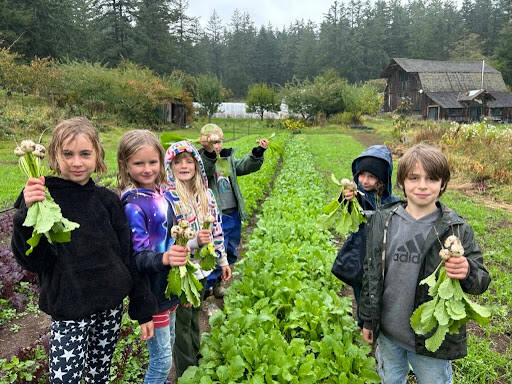Submitted by Salmonberry School.
From its inception, Salmonberry School has strived to create programs for kids that deepen their experience of learning and intentionally reflect the core values of this island community. In particular, Salmonberry has been able to integrate hands-on, firsthand encounters with the plant and animal realms to teach children to care for all living things in ways that are fun as well as powerful.
This year, members of Salmonberry’s Otters class spent many school days at a local organic farm. Here 1st and 2nd grade students were guided through many elements of the year’s growing cycle. They learned methods and skills that allow them to partner with nature in growing food. They were also taught traditional woodcraft and other handwork using hand tools and other sustainable methods. Teacher Aliza Diepenbrock recalled, “Among many aspects of learning that our time on the farm offered, it has been amazing to witness the students’ ability to internalize an ethic of care, awe, and curiosity as we structured our days in relationship to farming, to earth, and to each other. Our time on the farm became an extension of the same core curricular values we bring to each day of school together whether within or beyond the classroom walls.”
Meanwhile members of Salmonberry’s Cedars class of 3rd graders has spent one full day each week all year, rain or shine, in an awe-inspiring old growth cedar grove on the island. Here students have kept nature journals, connected with “sit spots,” experienced the calming energy of the forest, explored the area and hiked the mountain, used cooperative problem-solving with a partner during “construction” and played together with only the things nature provides.
“We don’t only do place-based nature studies here,” reflects teacher Angela Baker, “kids do math, science, reading and writing. We bring all elements of the curriculum to the outdoors. Being outdoors in all weather creates resiliency, enhances creativity, and benefits our sensory system.”
A recent addition to Salmonberry’s experiential approach to education has been a weekly herbalism class taught by Lily Ostle. In this class kids have learned to identify local plants. They have wildcrafted, harvested and processed natural ingredients to create teas, infused vinegars, and other useful items as well as artwork. Recently they have learned the basic principles of hügelkultur to build garden beds and grow produce on campus. Salmonberry believes that ecological literacy should be a cornerstone to any 21st century education.
Ostle says, “Giving the kids opportunities to get to know native, wild and cultivated plants through their senses is beyond rewarding. I’m so proud of the work and joyous love of the earth the kids put into saving seeds and creating their garden beds. Look for our school’s farmstand later this year!”
Founding Head of School, Paul Freedman adds, “When kids look forward to their classes at school, it can change their entire outlook. Experiential learning is a foundational element of Salmonberry’s approach. It drives learning deeper and school becomes relevant and meaningful. Nurturing living things in reciprocal relationship is a core value of the school. When these elements come together, experiential and nature-based learning, we find that kids love school. And when kids love school, amazing things happen!”




